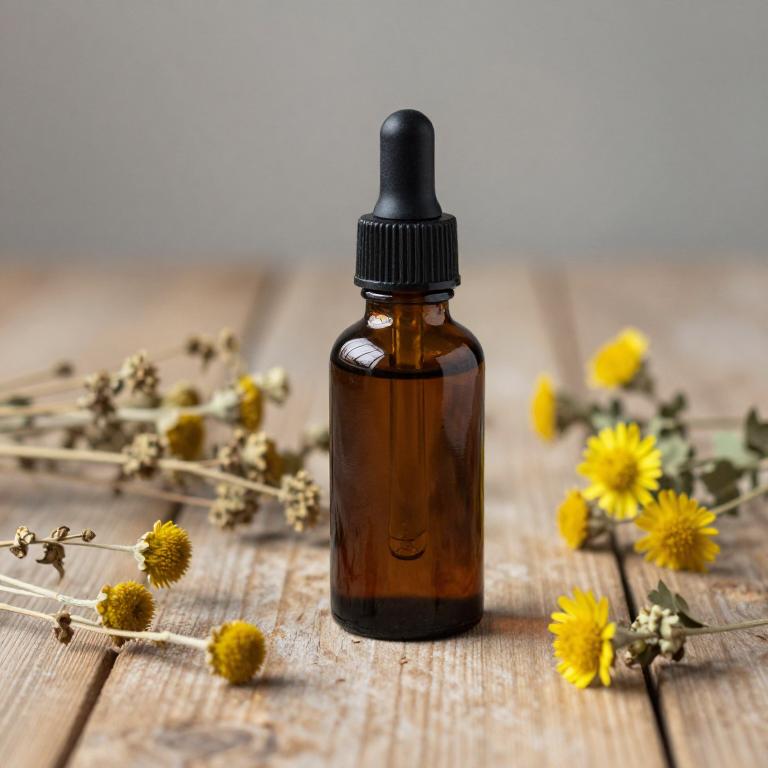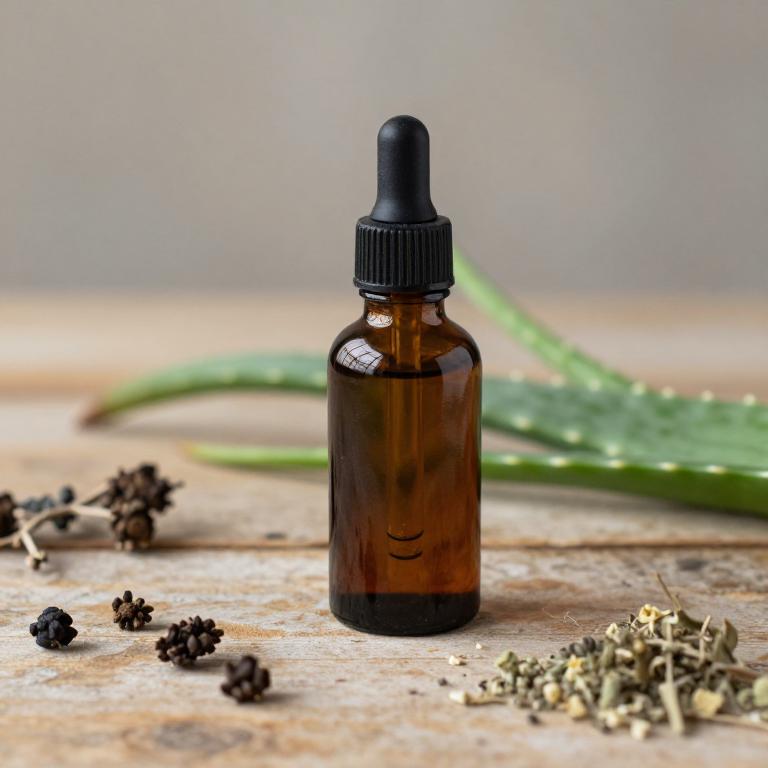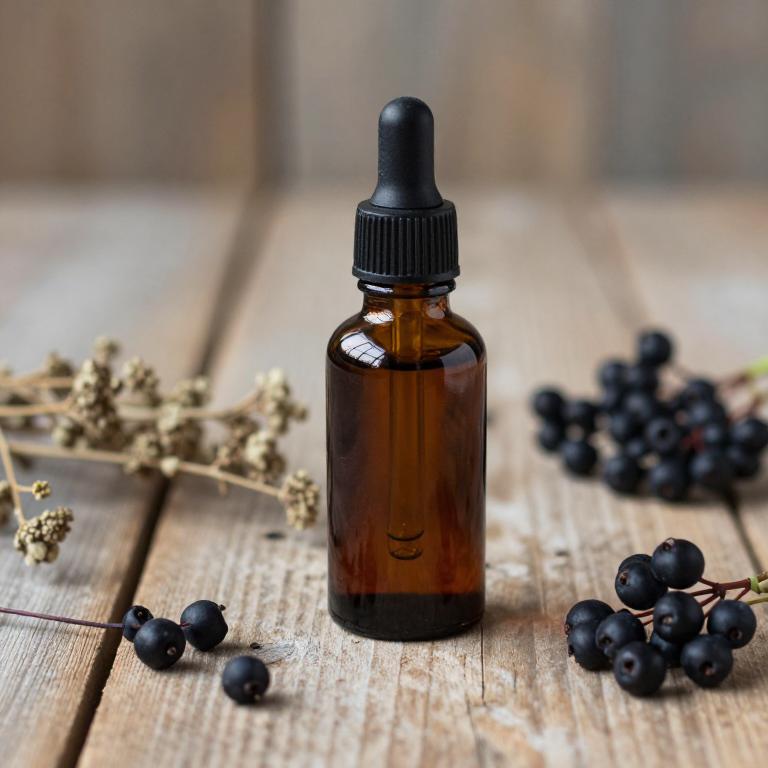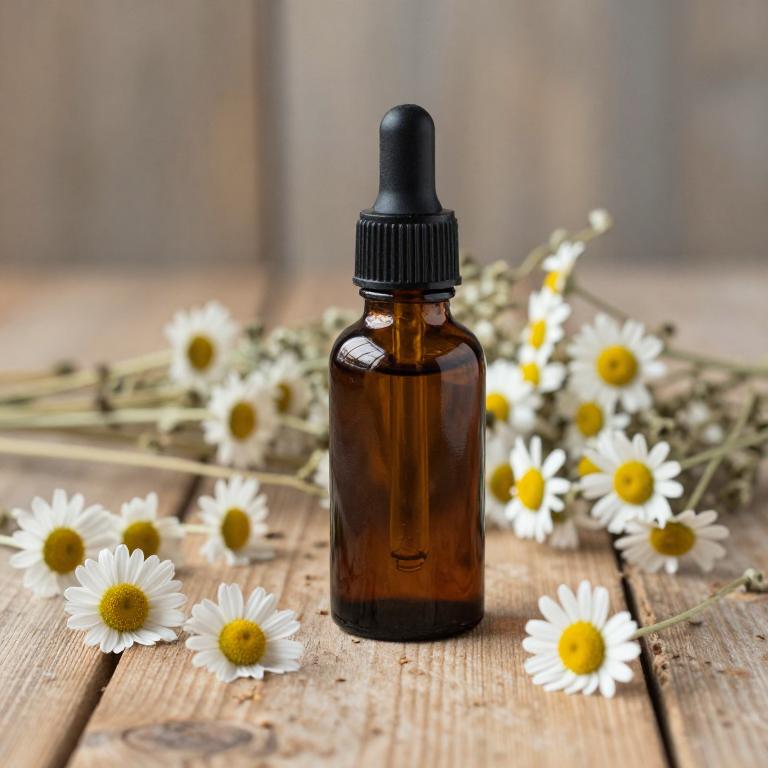10 Best Herbal Tinctures For Acne

Herbal tinctures for acne are concentrated liquid extracts made from various plant-based ingredients known for their skin-soothing and anti-inflammatory properties.
Common herbs used in these tinctures include calendula, chamomile, echinacea, and St. John's wort, which are believed to help reduce inflammation, fight bacteria, and promote healing of acne-prone skin. These tinctures can be applied topically to the skin or taken internally under the guidance of a healthcare professional, depending on the formulation. They are often preferred by individuals seeking natural alternatives to conventional acne treatments, though their effectiveness can vary based on the specific herbs and individual skin responses.
It is important to consult with a healthcare provider before using herbal tinctures, especially if you have existing health conditions or are taking other medications.
Table of Contents
- 1. St. john's wort (Hypericum perforatum)
- 2. Dog rose (Rosa canina)
- 3. Stinging nettle (Urtica dioica)
- 4. German chamomile (Chamomilla recutita)
- 5. Aloe vera (Aloe barbadensis)
- 6. Echinacea (Echinacea purpurea)
- 7. Salvia (Salvia officinalis)
- 8. Ginger (Zingiber officinale)
- 9. Black elderberry (Sambucus nigra)
- 10. Chamomile (Matricaria chamomilla)
1. St. john's wort (Hypericum perforatum)

Hypericum perforatum, commonly known as St. John's Wort, is a herbal plant often used in tincture form for its potential skin benefits, including the treatment of acne.
The tincture is believed to possess anti-inflammatory and antimicrobial properties that can help reduce redness, swelling, and bacterial growth associated with acne. When applied topically, it may help to regulate sebum production and promote skin healing. However, it is important to note that St. John's Wort can interact with certain medications and should be used with caution.
As with any herbal remedy, it is advisable to consult with a healthcare professional before incorporating it into a skincare routine.
2. Dog rose (Rosa canina)

Rosa canina, commonly known as rose hips, is a rich source of bioflavonoids, vitamin C, and essential fatty acids, making it a popular ingredient in herbal tinctures for acne treatment.
These tinctures are traditionally used to support skin health by reducing inflammation and promoting the healing of blemishes. The anti-inflammatory and antioxidant properties of rose hips may help to regulate sebum production and prevent the formation of acne lesions. When used as part of a holistic skincare routine, Rosa canina tinctures can complement other acne treatments by soothing irritated skin and enhancing overall skin resilience.
However, it is important to consult with a healthcare professional before incorporating these tinctures into a skincare regimen, especially for individuals with sensitive or severe acne conditions.
3. Stinging nettle (Urtica dioica)

Urtica dioica, commonly known as stinging nettle, has been traditionally used in herbal medicine for its potential skin benefits, including the treatment of acne.
When prepared as a tincture, Urtica dioica can be applied topically to help reduce inflammation and redness associated with acne breakouts. The tincture is believed to work by detoxifying the skin and balancing sebum production, which can prevent clogged pores and bacterial growth. It is often recommended as a natural alternative to conventional acne treatments, though it should be used with caution and under the guidance of a healthcare professional.
Overall, Urtica dioica tinctures offer a holistic approach to managing acne by supporting the body's natural healing processes.
4. German chamomile (Chamomilla recutita)

Chamomilla recutita, commonly known as German chamomile, is widely used in herbal tinctures for its anti-inflammatory and antimicrobial properties, making it a popular choice for treating acne.
These tinctures are typically prepared by soaking dried chamomile flowers in alcohol, allowing the active compounds like bisabolol and chamazulene to be extracted. The anti-inflammatory effects of chamomile can help reduce redness and swelling associated with acne breakouts, while its antimicrobial properties may help combat the bacteria that contribute to acne formation. When used topically, chamomile tinctures can soothe the skin and promote healing without the harsh side effects of many conventional acne treatments.
However, it is important to dilute the tincture properly before applying it to the skin to avoid irritation, and individuals with allergies to plants in the Asteraceae family should exercise caution.
5. Aloe vera (Aloe barbadensis)

Aloe barbadensis, commonly known as aloe vera, has been widely used for its soothing and healing properties, and its herbal tinctures are gaining popularity for their potential benefits in treating acne.
These tinctures are typically made by extracting the gel from the aloe plant and combining it with alcohol, which helps preserve the active compounds and enhance its potency. Aloe vera tinctures are believed to reduce inflammation, regulate oil production, and promote skin healing, making them a natural alternative for those seeking acne treatment. They can be applied topically to the skin as a spot treatment or incorporated into a daily skincare routine.
However, it is important to consult a healthcare professional before use, especially for individuals with sensitive skin or existing skin conditions.
6. Echinacea (Echinacea purpurea)

Echinacea purpurea, commonly known as purple coneflower, is a popular herbal remedy often used in tincture form for its potential anti-inflammatory and immune-boosting properties.
While primarily known for its use in supporting the immune system, echinacea tinctures may also help reduce inflammation associated with acne due to their antioxidant and antimicrobial effects. Some studies suggest that echinacea can help regulate sebum production and reduce redness, making it a potential complementary therapy for acne-prone skin. However, it is important to note that echinacea may not be effective for all types of acne and should be used in conjunction with other proven treatments under the guidance of a healthcare professional.
As with any herbal remedy, individual responses can vary, and it is advisable to consult a dermatologist before incorporating echinacea tinctures into an acne treatment regimen.
7. Salvia (Salvia officinalis)

Salvia officinalis, commonly known as sage, has been traditionally used for its potential skin-healing properties, and its herbal tinctures are increasingly being explored for their benefits in managing acne.
These tinctures are typically made by soaking dried sage leaves in alcohol, allowing the active compounds, such as rosmarinic acid and flavonoids, to be extracted. The anti-inflammatory and antimicrobial properties of sage may help reduce redness, inflammation, and bacterial growth associated with acne. Some studies suggest that sage can regulate sebum production, which is a key factor in preventing breakouts.
However, while preliminary research is promising, more clinical trials are needed to fully understand its efficacy and safety for acne treatment.
8. Ginger (Zingiber officinale)

Zingiber officinale, commonly known as ginger, has been traditionally used for its anti-inflammatory and antioxidant properties, making it a popular ingredient in herbal tinctures for acne treatment.
These tinctures typically combine ginger extract with alcohol or other solvents to preserve and concentrate its active compounds, such as gingerol and shogaol, which have shown potential in reducing skin inflammation and bacterial growth. When applied topically, ginger tinctures may help soothe redness, reduce acne lesions, and promote skin healing by improving circulation and detoxification. However, it is important to dilute the tincture properly to avoid skin irritation, as undiluted ginger can be too potent for sensitive skin.
Overall, ginger-based tinctures offer a natural alternative for managing acne, though they should be used as part of a comprehensive skincare routine and under the guidance of a healthcare professional.
9. Black elderberry (Sambucus nigra)

Sambucus nigra, commonly known as European elderberry, has been traditionally used in herbal medicine for its potential skin benefits, including the treatment of acne.
Sambucus nigra herbal tinctures are often prepared using the berries, flowers, or leaves, and are believed to possess anti-inflammatory and antimicrobial properties that may help reduce acne-causing bacteria and inflammation. These tinctures can be applied topically or taken internally, though it is important to follow proper dosage guidelines to avoid toxicity, as raw elderberries can be harmful. Some studies suggest that the flavonoids and antioxidants in elderberry may support skin health by promoting cellular repair and reducing oxidative stress.
While more research is needed, many individuals use sambucus nigra tinctures as a natural alternative to conventional acne treatments, often in combination with other herbal remedies.
10. Chamomile (Matricaria chamomilla)

Matricaria chamomilla, commonly known as chamomile, is a popular herb used in the form of tinctures to address skin concerns, including acne.
Chamomile tinctures are valued for their anti-inflammatory and antimicrobial properties, which can help reduce redness, swelling, and bacterial growth associated with acne breakouts. These tinctures are often applied topically to the skin, either diluted with a carrier oil or water, to provide a soothing and cleansing effect. Due to its calming nature, chamomile may also help alleviate the stress and irritation that can exacerbate acne.
While generally safe for most skin types, it is advisable to perform a patch test before using chamomile tinctures to ensure no allergic reactions occur.